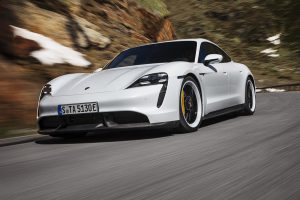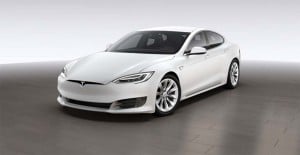Porsche has been winning kudos for the performance of its new all-electric sports car but, for some potential buyers, there could be a real disconnect when it comes to range.
The EPA last month gave the mid-range 2020 Porsche Taycan Turbo a less-than-stellar rating of 201 miles per charge. Now, it says, the quick Taycan Turbo S will deliver an even more limited 192 miles between plug-ins. It remains to be seen if that will lead some customers to back off, especially in colder climes where weather can significantly reduce rated range.
Studies show that most American motorists actually could get by easily with either model, the typical daily drive averaging under 50 miles. On the other hand, industry data also reveals that buyers tend to select vehicles that can meet their most extreme needs, such as long vacation trips.
That’s why the majority of customers have been opting for the longer-range options from Tesla. The California EV maker can deliver as much as 348 miles with the Model S Performance package, at 762 horsepower the most powerful product it has so far brought to market.
Carrying a price similar to the Taycan Turbo models, the Model S Performance is equipped with a 100 kilowatt-hour battery. By comparison, Porsche managed to squeeze in just a 93.4 kWh pack. More significantly, according to EV analysts TheDetroitBureau.com has spoken to, the German marque’s electric technology may be quick – managing 0-60 launches in barely 3 seconds – but it is nowhere as efficient as Tesla’s.
Actually, parent Volkswagen AG catches much of the blame. VW is making a massive push into battery power, investing about $13 billion by mid-decade when it plans to have as many as 50 different models in its global portfolio. But initial offerings aren’t exactly delivering benchmark range. The new Audi e-tron SUV that came to market in mid-2019 manages just 204 miles per charge, according to the EPA.
The Tesla Model X SUV delivers 325 miles per charge. It has a 100 kWh battery slightly larger than the e-tron’s. But even the Jaguar Model S, which has a roughly 90 kWh pack, about the same as the Audi, manages 234 miles range.
(Porsche adds third, lower-priced version of new Taycan.)
There are a variety of factors that impact the range a vehicle can get from a given amount of batteries, including weight, aerodynamics and the efficiency of both the pack, the motors and the controlling electronics. Several analysts we have spoken to say VW’s battery drive technology is a central source of its range challenge.
Of course, performance has a direct impact on an EV’s range, much as is the case with a vehicle using an internal combustion engine. Something with a big V-8 can’t match the fuel economy of a similar product using a six or four-cylinder engine, even if both are driven the same way.
That helps explain why the Porsche Taycan Turbo S model has the lower EPA number.
(Will 2020 be “the year of the electric vehicle”?)
The German manufacturer does boast that its new sports car can be driven aggressively as long as there’s a charge left in the battery. Early on, Tesla products were able to manage maximum performance for only short runs due to battery pack and motor overheating issues. The automaker has taken steps to address that issue, however.
There’s another factor that can influence the range of an electric vehicle: the testing method used. Initially, European regulators used a process that yielded significant overestimates, lately migrating to a new protocol dubbed WLTP. The EPA uses an even more aggressive standard yielding the lowest results.
That’s led Porsche to challenge what the U.S. agency has come up with. It turned to private firm AMCI to conduct its own tests and the widely respected firm said it expects the Taycan Turbo to deliver 283 miles per charge, the Turbo S 278 miles. But those numbers won’t be published on the EPA’s official site, nor posted on the Munroney sticker potential buyers will find on every new Taycan in showrooms. Whether the low government range numbers for the sports cars will impact sales remains to be seen.
(Tesla shares soar to record levels – but will gravity eventually step in?)




Keep laughing at Musk. It’s no wonder Tesla stock is going through the roof.
Did VW even bother to reverse engineer a Tesla or are they convinced they are smarter?
Let’s hope Ford does better with their Mustang SUV.